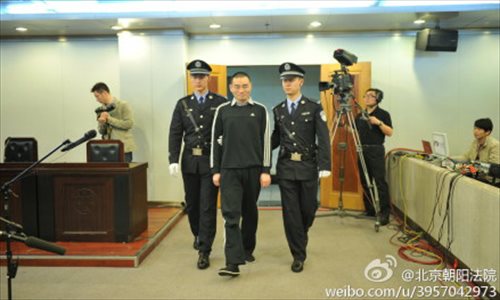HOME >> CHINA
Accused rumormonger freed after custody
By Liu Xuanzun Source:Global Times Published: 2019/10/29 0:13:39

Qin Zhihui, the first person to be sentenced after a crackdown against online rumormongering.
A villager from North China was released after being detained for eight days after he was accused of spreading rumors about a fertilizer brand, in a case that sparks controversy on social media, with some netizens saying the man's detention was extreme and experts urging the police to release more details and evidence to justify their actions.
Local police in Hanggin Banner, Ordos, North China's Inner Mongolia Autonomous Region said a man surnamed Liang was accused of spreading rumors and was released after completing eight days of administrative detention, Red Star News, a Sichuan-based news site affiliated with Chengdu Business Daily, reported on Sunday.
Liang accused a fertilizer company of producing poor quality products in a social media chat group of some 50 people on August 25 and 26, according to a statement from the local police, which released the information on its WeChat account on October 18.
Liang had not bought nor used the fertilizer, nor did he have any evidence proving his claims, the statement said, adding that the police held Liang for eight days in accordance with the Public Security Administration Punishments Law.
The law states that a person accused of disturbing public order by spreading rumors can be detained for between five and 10 days and fined.
The Red Star News report, which cited a police document, said Liang's social media criticism led to more than 20 villagers making a banner, gathering and protesting and blocking an entrance. The report did not mention where the entrance was located.
Some netizens said the punishment was overkill, saying that spreading wrong information in a group of only about 50 people should be considered private and should not result in detention. Others asked if the fertilizer was indeed of proper quality, some even speculated that the fertilizer company used its connections with the police to silence a critic.
The internet is not a lawless place and net users should use more rationality and be less impulsive, the police said in the statement, adding that posting improper content and insulting others on the internet will be punished by law.
Chat groups belong to public places on the internet regardless how many people are involved, and spreading rumors can result in administrative or even criminal penalties, Zhu Wei, a professor at the China University of Political Science and Law, told the Global Times.
If what Liang claimed was indeed proved to be a rumor, the police handled the case well, Zhu said.
However, the police did not provide the result of a quality test on the disputed fertilizer in the statement.
Experts urged the police to be more transparent on the case instead of announcing a result in a vaguely phrased statement.
Zhi Zhenfeng, a legal expert at the Chinese Academy of Social Sciences in Beijing, told the Global Times that the police released few details on the case for the public to judge the incident.
The police should explain things more clearly, like why Liang's claim was identified as a rumor, how the protest was related to the rumor, and what negative impact the protest had on public security, to justify taking Liang in custody, Zhi said.
Posted in: SOCIETY,CHINA FOCUS